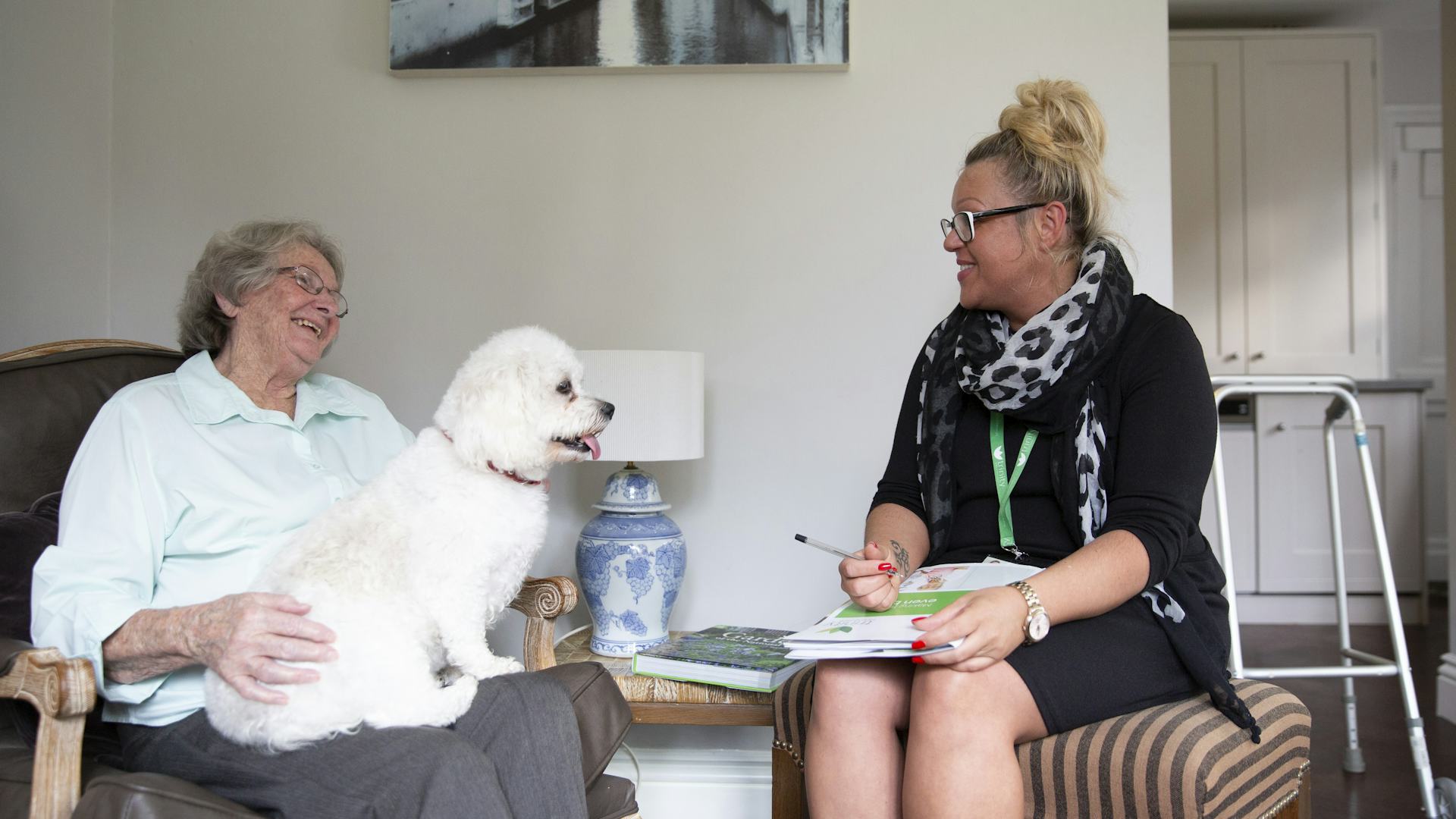Should someone with dementia go into a care home?

It can be a heart-breaking decision. Encouraging or deciding that a loved one should relocate to a residential home because of their worsening dementia is never easy. As an ‘Outstanding’ care provider, we understand that. This article discusses at which point someone with dementia should start to receive care and the care options that would be best suited for them.
The question itself “When should someone with dementia go into a care home?” is one that requires a few different things to be considered before you can answer this question.
The first is the consideration to find out at what stage of dementia they are at. Depending on the stage of dementia will determine what treatments are required and how the person with dementia is able to live a normal life or the need for increasing levels of support.
You can then think about what support you can provide to get a better idea of what additional help you will need to look have in place.
Stages of dementia
Dementia has three mainstages:
- Mild or Early
- Moderate or Middle
- Severe or Late
How is dementia assessed to get a dementia diagnosis?

There are three scales (*) used to diagnose and measure the progression of dementia. These three scales are used for communication with the patient and their family. They are also used for research purposes.
The most common use is the Global Deterioration Scale (GDS). This is used to diagnose Alzheimer’s, which is the most common form of dementia.
Then there is the Functional Assessment Staging Test and the Clinical Dementia Rating that is used widely in dementia research rather than between medical professionals and patients.
Global Deterioration Scale (GDS) or the Reisberg Scale
The most common scale used for diagnosis purposes is the Global Deterioration Scale (GDS) or more often referred to as the Reisberg Scale.
The GDS is divided into seven stages that are each based on the amount of cognitive decline. This test is most relevant for people who have Alzheimer’s disease because some other types of dementia (i.e. Frontotemporal dementia) do not always include memory loss. By using the GDS, you can diagnose Alzheimer’s quicker than by using the other methods of diagnosis first.
It is often the case that dementia and Alzheimer’s get missed and it is not diagnosed at an early stage. This is due to someone in the first three stages not showing enough symptoms. A diagnosis of dementia is often made at the earliest of Stage 4 where the cognitive decline is easier to pick up and define for a possible diagnosis of dementia. Stage 4 on the Reisberg Scale is considered as the mild or early stage of dementia. Stages 5 and 6 are the middle or moderate stage of dementia, with Stage 7 being the final stage considered as severe or late stage of dementia.
Read more about the signs, symptoms and stages of dementia
Functional Assessment Staging Test (FAST)
The Functional Assessment Staging Test (FAST) scale describes the stages of dementia. FAST is also a system that is seven-stages based on the persons level of functioning and ability to perform activities of daily living (ADLs) instead of cognitive decline. It can often be seen that a person may be at a different stage cognitively (GDS stage) than functionally (FAST stage).
Clinical Dementia Rating (CDR)
The Clinical Dementia Rating (CDR) scale is often used in dementia research and not as a tool for communication between medical professionals, patients, and their families. The CDR scale uses a five-point system based on cognitive (thinking) abilities and how well a person functions.
Someone with suspected dementia is evaluated in six areas:
- Memory
- Orientation
- Judgment and problem solving
- Community affairs
- Home and hobbies
- Personal care
This test is conducted by interviews with the subject and others, including family members. Based on the findings of these interviews one of the five possible stages is then assigned.
These tests are good to have an awareness of so you can understand how severe your loved one’s dementia is and what support they may need. Ultimately, if you spend time with the person living with dementia, you will very quickly gain an understanding of the stage their dementia has reached and how their memory, judgment and communication has been affected. It is very possible to live well with dementia, you just need the right care.
What help and support is available for dementia?

There are several options for care for dementia. As discussed, earlier dementia can easily be missed and diagnosed at a later stage when symptoms are easier to spot and diagnose.
Having the late diagnosis often comes as a shock because there is now a high level of care needs and support that you need to suddenly find. With the new level of support that you now know is needed it is often a daunting situation to be in and initially hard to think how you can best support your loved one fully.
Often the first thought could be to look for a care home. However, there are also other options depending on the stage of the diagnosis. Along with the option of a care home, there are supported living options as well as visiting and live-in care.
At this stage you need to speak to your local adult care team and request a care needs assessment.
Does someone with dementia need to go into a care home?
There is no reason someone with dementia should go into a care home and not have live-care or visiting care at home. Having a live-in carer can often be more beneficial to the person living with dementia. The question should not be; “when should someone with dementia go into a care home?”, but should be “what level of care should someone with dementia have”?
Depending on the stage of the dementia will dictate what level of care and support they need. The person living with dementia may live with a partner or already live with family. The people and support they already have around them will also play a part in the new level of additional support required. If they live on their own, they may need support at an earlier stage than if they live with others.
Once you have looked at the support already in place and what is going to be needed you can look at all the options you have.
Often people being discharged from hospital with a diagnosis of dementia can be initially placed into a care home. Other circumstances could include a carer becoming too ill to be able to care for the person. There could also be new concerns you need to consider now you know the diagnosis and for the person’s safety as the dementia progresses.
Does live-in care allow you to stay more involved?
Care homes can be restrictive. Keeping the person living with dementia at home will keep them in familiar surrounds that will help them retain memories longer. Once those memories start to fade, they will be more easily recalled and easier to discuss as they will be in the surroundings they know.
There are services available for care at home ranging from visits and support during the day to a live-in carer and can at times include a carer during the night if the person does not sleep well or for long. Friends and family can often all do their own little bit to help keep the person at home and in familiar surroundings.
You should request a care needs assessment from the local adult social services team. These are free and everyone is entitled to have one.
What things should you consider when thinking about live-in care for dementia?

If you are finding this subject difficult, it might help to break down the process into the following things. We have provided a list of questions that you can answer which may help your decision.
- Is the person able to decide about their own care? Do they have any wishes or opinions on what options they wish for the future?
- What options have you considered, such as a care home, care at home, supported living or getting in additional services which may help the person to get the care they need?
- What would be the benefits for you and the person with dementia if they moved to a care home? Would you be happy with the restrictions a care home would have in place for visiting, pets or other additional rules?
- What care and support can the family and friends realistically commit to? Where are the gaps that you would need support from carer staff?
- What things make the person feel most comfortable, safe, and content?
Here is a link to our guide library where you can download and read our guides to help answer some further questions.
Article Resources (*)
The three dementia scales used to measure and diagnose dementia
Dementia Care Central
https://www.dementiacarecentral.com/aboutdementia/facts/stages/








